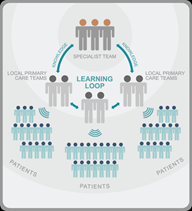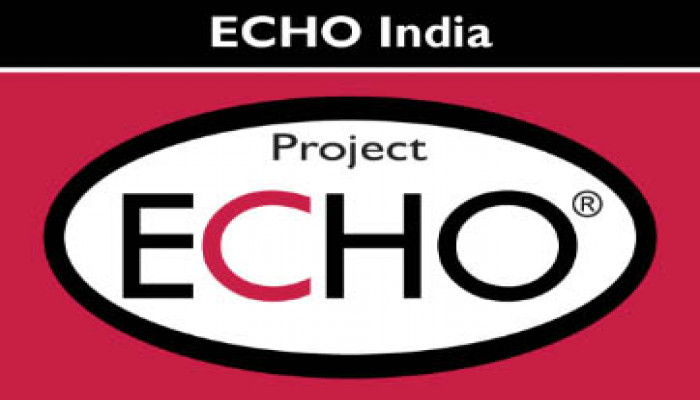Project ECHO: Moving Lifesaving Medical Knowledge to where it is needed, particularly in Rural India
- In Society
- 08:59 PM, Nov 20, 2022
- Dr Nick Nipan Shroff & Dr Sanjeev Arora
Project ECHO is tackling the world’s most significant challenges. Created in 2003 to deliver specialized medical knowledge to rural healthcare providers, Project ECHO builds communities of practice through free virtual mentoring and learning. This guided-practice model reduces health disparities in underserved areas intending to reach 1 billion lives by 2025.
Sanjeev Arora, MD, founded Project ECHO and continues to lead this innovative organization. ECHO operates in 193 countries with more than 800 partners, covering 70+ complex medical conditions, and providing education, training, and software to support replication initiatives worldwide. More than 500 peer-reviewed publications have confirmed that the ECHO Model is an effective way to enhance the capacity, knowledge, and skills of healthcare providers.
Under the leadership of Dr. Kumud Rai as Chairman and Dr. Sunil Anand as Executive Director, ECHO India has completed more than 220 programs, with 306 in progress. These cover 25+ areas, including cancer screening, palliative care, mental health, liver disease, and tuberculosis. Begun as a healthcare initiative, ECHO also serves other disciplines, including mentoring and training teachers and journalists and addressing the air pollution problem in Delhi NCR.
How does ECHO work

The ECHO hub-and spoke model encourages an all teach, all learn approach to knowledge sharing.
The ECHO Model moves specialized knowledge from academic and tertiary care centers (hubs) to community-based healthcare clinics (spokes) using case-based learning and guided practice, increasing the capacity of healthcare providers over time.
Teams of experts at ECHO hubs co-manage patient cases and promote an all-teach, all-learn strategy using group discussion to help participants increase their knowledge. Best practices are shared as rural providers educate hub teams and peers on resource constraints, cultural barriers, and patient outcomes based on the hub team’s recommendations. ECHO’s multidirectional teaching and learning culture creates virtual communities of practice where participants seek additional mentoring and share innovations.
As of November, 152 active hubs are serving 24 states in India. Some of the most respected research institutes in India serve as hub teams, including the National Institute for Mental Health and Neurosciences (NIMHANS), the National Institute of Cancer Prevention and Research (NICPR), and the National Institute of Tuberculosis and Respiratory Diseases (NITRD).
ECHO India mobilizes for COVID-19
ECHO was uniquely suited to quickly mobilize a geographically disparate workforce for detecting and treating COVID-19 and to disseminate best practices. In early 2020, 54 of the 56 existing ECHO hubs immediately suspended training on their regular topic to train regional providers on COVID-19 prevention, treatment, and containment. Between March and April 2020, the number of participating spokes climbed from 12,377 to over 227,942 spokes.
ECHO has been a pipeline to help public health officials communicate updates and guidelines to clinicians attending remotely throughout the pandemic. During the first six months, ECHO hubs trained 400,000+ clinicians on COVID-19 topics, from public health and epidemiological considerations to clinical guidelines and vaccination updates. Included among these participants is a network of community health workers who have undertaken the work of going door-to-door in villages to educate residents on preventing COVID and proper self-isolation procedures for symptomatic individuals. In addition, ECHO India’s team and partners have provided 3300+ COVID-19 training sessions to healthcare providers, many of whom lacked access to quality training due to geographic isolation.
In September 2020, one ECHO session on ventilator safety hosted by ECHO India, the Ministry of Health, and AIIMS trained providers at 1,000 spokes in a single day.
ECHO also works with palliative care experts to train providers to offer quality end-of-life care and alleviate suffering for patients and their families. Palliative Care for Healthcare Providers Treating People (Pallicovid ECHO) is a collaborative effort by Pallium India and PalliCovid Kerala. In addition to palliative care services, Pallicovid ECHO addresses feelings of helplessness among attending staff, improving work satisfaction and morale.
ECHO India will continue to build its partnership with the Government of India’s Ministry of Health and Family Welfare to educate healthcare providers on health priorities by the national government, including eradicating tuberculosis and hepatitis C and increasing access to mental and behavioral health and addiction services.
Project ECHO is efficient, equitable, and sustainable. ECHO will continue to learn from COVID-19 experiences to prepare for the next public health emergency while building workforce capacity to cure diseases we already know how to treat and improve health outcomes for those in India who need it most.
Image source: ECHO India
Disclaimer: The opinions expressed within this article are the personal opinions of the author. MyIndMakers is not responsible for the accuracy, completeness, suitability, or validity of any information on this article. All information is provided on an as-is basis. The information, facts or opinions appearing in the article do not reflect the views of MyindMakers and it does not assume any responsibility or liability for the same.







Comments